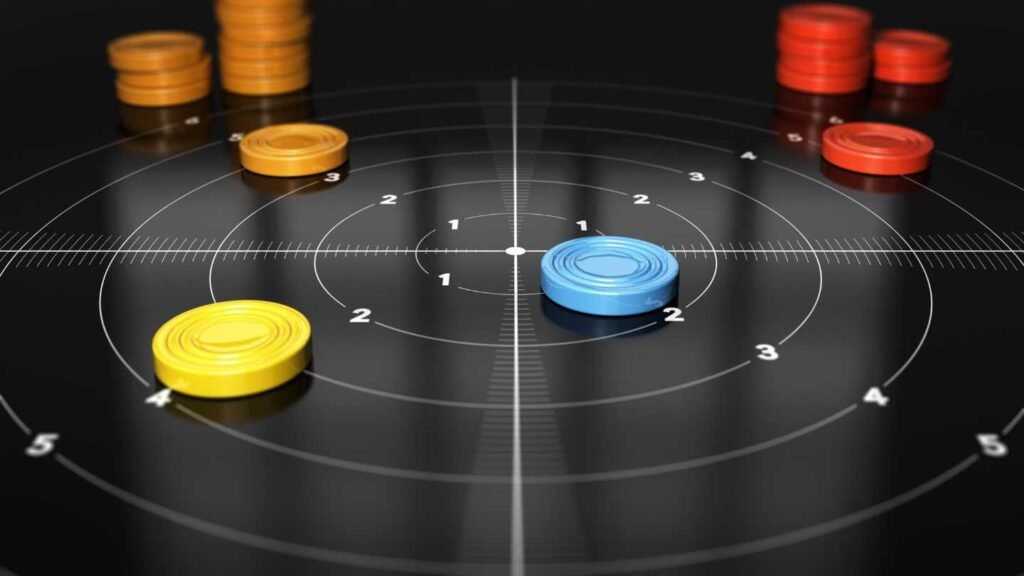Preparando-se para seu primeiro torneio de poker é emocionante. Os torneios de poker são eventos que reúnem jogadores experientes e recém-chegados ansiosos para testar suas habilidades. Se você está se preparando para seu primeiro torneio de pôquer, pode parecer opressor, especialmente com a miríade de estratégias, regras e nuances a serem consideradas. No entanto, com a preparação e a mentalidade certas, você pode aumentar suas chances de sucesso e aproveitar a experiência.
Neste guia, orientaremos você pelas etapas essenciais para ajudá-lo a se preparar para sua primeira oferta de conselhos especializados, estratégias-chave e armadilhas comuns a serem evitadas. Esteja você com o objetivo de competir em um torneio local ou procurando dicas para grandes eventos, este artigo lhe dará uma base sólida.
Quer entender por que o poker continua a cativar milhões em todo o mundo? Descubra o Emoção e adrenalina no poker por trás do jogo.
1. Entenda o formato do torneio

Antes de se inscrever em um torneio, é crucial entender o formato. Preparando-se para o seu primeiro Preparando-se para seu primeiro torneio de poker pode variar em estrutura, sendo alguns No-Limit Texas Hold'em, outros Pot-Limit Omaha e assim por diante. Aqui estão alguns dos formatos mais comuns:
Texas Hold'em Sem Limite
Este é o mais popular Jogo de pôquer jogou em torneios em todo o mundo. No No-Limit, você pode apostar qualquer quantidade de fichas durante uma mão, tornando-o um jogo de alto risco e alta recompensa.
Pot-Limit Omaha
Essa variação é frequentemente preferida por jogadores que gostam de mais complexos estratégias de poker. No Pot-Limit Omaha, os jogadores podem apostar até o tamanho do pote, tornando o estilo de jogo mais agressivo.
Torneios Sit-and-Go
Estes são torneios rápidos e de pequena escala, normalmente jogados com um determinado número de jogadores (geralmente 6 ou 9). Eles começam assim que todos os assentos são preenchidos e são uma ótima opção para iniciantes que procuram uma experiência menos demorada.
Torneios Multi-Mesa
Estes são torneios maiores onde os jogadores competem contra centenas ou milhares de outros. Entender como jogar em um formato multi-mesa - gerenciando seu stack, tomando decisões estratégicas e ajustando sua jogabilidade - é essencial para o sucesso.
Torneios ao vivo vs. online
Preparando-se para seu primeiro torneio de poker vêm em dois formatos principais: ao vivo e online. Embora ambos compartilhem as mesmas regras fundamentais, os torneios ao vivo podem ter um ritmo e uma atmosfera diferentes. Os torneios online, por outro lado, geralmente apresentam blinds mais rápidos e uma experiência mais simplificada.
2. Conheça as regras do jogo
Entendendo as regras básicas de atiçador é um dado, mas cada torneio pode ter suas variações específicas. Revise as regras do torneio antes de jogar, incluindo quaisquer regras ou restrições exclusivas da casa. Conhecer esses detalhes ajuda a evitar erros e garante que você esteja preparado para a estrutura específica do torneio.
Principais Rankings de Mãos de Poker Preparando-se para o Seu Primeiro Torneio de Poker
Um aspecto essencial de qualquer Jogo de pôquer é conhecer as classificações das mãos. Aqui está uma rápida atualização:
- Royal Flush – A, K, Q, J, 10 todos do mesmo naipe.
- Straight Flush – Cinco cartas consecutivas do mesmo naipe.
- Quadra – Quatro cartas do mesmo valor.
- Casa cheia – Trinca + um par.
- Flush – Cinco cartas do mesmo naipe, mas não em sequência.
- Reto – Cinco cartas consecutivas de qualquer naipe.
- Trinca – Três cartas do mesmo valor.
- Dois pares – Dois pares de cartas do mesmo valor.
- Um par – Duas cartas do mesmo valor.
- Carta alta – A carta mais alta quando nenhuma outra mão é feita.
Regras Específicas do Torneio
Alguns torneios podem ter regras adicionais, como re-buys, add-ons ou limites no número de entradas. Certifique-se de entender completamente como os blinds aumentam, como funciona a estrutura de pagamento e se há restrições ou limites de tempo específicos.
3. Pratique suas habilidades de pôquer
A melhor maneira de se preparar para um torneio de poker é praticando suas habilidades de poker. Seja você um iniciante ou tenha alguma experiência, aprimorar seu jogo lhe dará a confiança necessária para ter sucesso.
Plataformas de Poker Online
Plataformas de poker online como Estrelas do pôquer, O 888 poker e o Party Poker oferecem uma ótima maneira de praticar jogos de jogo grátis e dinheiro real. Esses sites permitem que você simule as condições do torneio e pratique estratégias contra jogadores reais.
Junte-se aos Fóruns de Poker
Preparando-se para seu primeiro torneio de poker Os fóruns são um ótimo recurso para melhorar seu jogo. Muitos jogadores experientes compartilham insights, estratégias e histórias valiosas sobre suas experiências em torneios. O envolvimento com essas comunidades pode melhorar sua compreensão do jogo e fornecer dicas práticas.
4. Gerencie sua banca
A gestão eficaz da banca é essencial para um sucesso Preparando-se para seu primeiro torneio de poker experiência. É fácil se deixar levar pela emoção e jogar de forma imprudente, mas manter uma estratégia sólida de bankroll ajuda a garantir que você permaneça no jogo por mais tempo.
Defina um orçamento
Antes de inserir um Torneio de pôquer, Defina um orçamento claro de quanto você está disposto a arriscar. Atenha-se a esse orçamento e não fique tentado a entrar em jogos de apostas mais altas do que você se sente confortável. A chave é jogar em um nível em que você possa absorver as perdas inevitáveis sem colocar suas finanças gerais em risco.
Use o nível de buy-in certo
Os buy-ins dos torneios variam significativamente. Geralmente, quanto maior o buy-in, mais difícil é a concorrência. Certifique-se de escolher um nível de buy-in que se alinhe com seu nível de habilidade e bankroll. Evite entrar em torneios de apostas altas até ganhar experiência suficiente.
5. Aprenda as estratégias
Preparando-se para seu primeiro torneio de poker exigem uma mentalidade diferente dos jogos a dinheiro. Você precisará ajustar sua estratégia ao longo do torneio, dependendo de fatores como tamanho do stack, posição e estágio do torneio.
Fases iniciais do torneio
Nos estágios iniciais, é importante jogar de forma conservadora. Você quer preservar seus chips e evitar riscos desnecessários. Concentre-se em um pôquer sólido e direto e evite fazer grandes blefes ou ir all-in, a menos que você tenha uma mão premium.
Estágios intermediários
À medida que o torneio avança, os blinds aumentarão e os jogadores começarão a correr mais riscos. É quando você precisa ajustar sua estratégia. Jogue agressivamente quando tiver uma boa mão e tente roubar blinds se estiver em posição final.
Fases Finais e Mesa Final
Nas fases posteriores do torneio, sua pilha de fichas e posição tornam-se cruciais. Na mesa final, você deve se concentrar na sobrevivência - jogue mais apertado, mas aproveite os erros de seus oponentes. À medida que o campo se estreita, você deve considerar ajustar sua estratégia com base nas tendências dos jogadores restantes.
6. Concentre-se na preparação mental
Preparando-se para seu primeiro torneio de poker é um jogo mentalmente desgastante e os torneios podem durar horas ou até dias. A força mental é tão importante quanto as habilidades de pôquer.
Fique calmo e focado
Durante um torneio, você pode enfrentar oscilações emocionais ao ganhar e perder mãos. Manter a calma e o foco é a chave para o sucesso. Não deixe que a frustração atrapalhe seu julgamento e tente evitar o tilt, que ocorre quando as emoções afetam negativamente sua jogabilidade.
Gerenciar a fadiga
Torneios longos podem ser exaustivos, por isso é importante manter-se preparado física e mentalmente. Faça pausas, mantenha-se hidratado e coma lanches saudáveis. Evite álcool e qualquer coisa que possa prejudicar seu julgamento. Se você estiver jogando em um evento de vários dias, descanse o suficiente entre as sessões.
7. Leia seus oponentes
Preparando-se para seu primeiro torneio de poker é um jogo de estratégia, mas também é um jogo de psicologia. Ler seus oponentes é uma habilidade crítica que separa os amadores dos profissionais.
Observe os padrões de apostas
Preste atenção em como seus oponentes apostam. Eles são agressivos ou apostam apenas com mãos fortes? Compreender seus padrões de apostas pode lhe dar uma pista sobre a força da mão e ajudá-lo a tomar decisões mais informadas.
Cuidado com os sinais
Tells são pistas físicas ou comportamentais que revelam informações sobre a mão de um jogador. Enquanto alguns jogadores têm um bom controle sobre sua linguagem corporal, outros dão pequenas dicas por meio de suas expressões faciais, postura ou comportamento de apostas.
8. Entenda a importância da posição

Na preparação para o seu primeiro, Sua posição na mesa é crítica. Estar em uma posição posterior fornece mais informações sobre como seus oponentes estão jogando suas mãos, enquanto estar em uma posição inicial requer mais cautela, pois você tem menos informações para agir.
Posição inicial
Na posição inicial, você tem que ser mais seletivo com as mãos. Se você estiver em um lugar inicial, espere por mãos premium antes de entrar nos potes.
Posição final
A posição final oferece mais flexibilidade, pois você pode usar as informações coletadas das ações dos jogadores anteriores. Você pode ampliar seu leque de mãos e fazer jogadas mais estratégicas.
Conclusão
Preparando-se para o seu primeiro Preparando-se para seu primeiro torneio de pokerEnvolve muito mais do que aprender as regras básicas do jogo. Compreender os formatos dos torneios, desenvolver estratégias fortes, gerenciar seu bankroll e se preparar mentalmente são componentes cruciais para o sucesso. Quanto mais você praticar e refinar suas habilidades, mais bem preparado estará para enfrentar os desafios do seu primeiro torneio.
Lembre-se, preparando-se para o seu primeiro Torneio de Poker é um jogo de longo prazo. Mesmo que você não ganhe seu primeiro torneio, cada experiência o ajudará a melhorar e desenvolver as habilidades necessárias para ter sucesso em eventos futuros. Boa sorte nas mesas!
Além disso, aqui está o porquê do O mundo não consegue parar de jogar poker - agora você faz parte dessa jornada.
Perguntas frequentes sobre como se preparar para seu primeiro torneio de poker
1º trimestre. Como se preparar para o primeiro torneio de poker
Um: Estude a estrutura de Preparação para o Seu Primeiro Torneio de Poker, aprenda as regras e entenda os níveis de blinds. Gerencie seu bankroll para garantir que você possa lidar com as oscilações e prepare-se mentalmente para longas horas de foco. Pratique jogando em jogos menores ou online para se sentir confortável com o ritmo.
2º trimestre. Como se preparar mentalmente para um Preparando-se para o seu primeiro torneio de poker
Um: Fique calmo e focado, aceitando que as perdas fazem parte do jogo. Esteja pronto para longos períodos de concentração e evite deixar que as emoções controlem suas decisões. Desenvolva uma mentalidade de paciência e disciplina para fazer escolhas racionais.
3º trimestre. Como posso melhorar nos torneios de poker
Um: Concentre-se em melhorar seu pensamento estratégico e compreensão das probabilidades de poker. Estude diferentes ranges de mãos, posicionamento e leitura de oponentes. Jogue regularmente e revise sua jogabilidade para identificar erros e aprender com eles.
4º trimestre. Como ganhar seu primeiro jogo de poker em Preparando-se para seu primeiro torneio de poker
Um: Jogue firme, agressivo Preparando-se para seu primeiro torneio de poker, concentrando-se em mãos iniciais fortes. Preste atenção aos comportamentos de seus oponentes e ao tamanho das apostas para avaliar sua força. Mantenha a disciplina, evite riscos desnecessários e ajuste sua estratégia com base no fluxo do jogo.
Pergunta 5. Qual é a melhor estratégia para torneios de poker?
Um: A melhor estratégia envolve jogar tight nos estágios iniciais, conservar fichas e depois se tornar mais agressivo à medida que os blinds aumentam. Preste atenção à sua posição, gerencie seu stack com sabedoria e ajuste com base nas tendências de seus oponentes.
Explore mais dicas de poker, hacks de mentalidade e estratégias em Macacos blefando.
